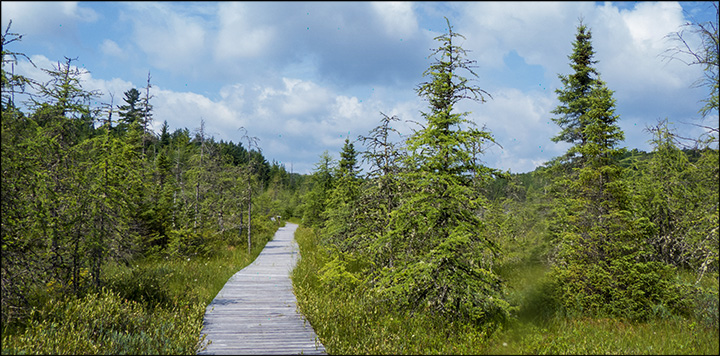EPA Citizen Scientist Wetland Monitoring Project:
Wetland Detectives Training Workshop II – Outdoor Observation
Saturday, 30 May 2015
9:00 AM - Noon
 Adirondack Wetlands: Barnum Bog from the Boreal Life Trail boardwalk at the Paul Smiths VIC.
Adirondack Wetlands: Barnum Bog from the Boreal Life Trail boardwalk at the Paul Smiths VIC.
Join the Wetland Detective Monitoring Corps! This second workshop in the Wetland Detective public training series builds on the information on wetland plants, birds, and amphibians learned in the first Wetland Detectives Training Workshop. However, if you were unable to attend either of the earlier workshops, that’s OK! You are still welcome to join the wetland monitoring corps.
- This second workshop will be outdoors. You will have the chance to explore a nearby wetland site where you will practice amphibian, bird, and plant monitoring skills. You will find that wetland monitoring is a great excuse to be outside taking in the sights and sounds of spring.
- By the end of the training workshop, you will have the tools you need to “adopt a wetland” and join the monitoring program’s team of citizen scientists.
- At the end, you will be assigned a wetland site for “adoption” that is located near you. By taking part in this workshop, you will join a community of people and institutions committed to improving our understanding of Adirondack wetlands and conserving these unique places for future generations.
To sign up, please RSVP to Kristin Pasquino and mention which workshop you will attend (phone: 518-582-2000 x12; email: aic@esf.edu). No prior citizen science experience is necessary. Bring a friend! These workshops are open to the public and designed for participants over the age of 15. Please check out the EPA Citizen Scientist Wetland Monitoring Project website for more information and updates.
This training session is free. You can download a copy of the Citizen Scientist Handbook, by clicking here. For more information and to sign up for the training workshop, contact:
Kristin Pasquino
Adirondack Interpretive Center
SUNY College of Environmental Science and Forestry
6312 Route 28N, Newcomb, NY 12852
Phone: 518-582-2000 Email: aic@esf.edu
Wetland Monitoring Project Target Species
The project focuses on the following peatland plant species:
| Balsam fir (Abies balsamea) | Bog laurel (Kalmia polifolia) |
| Black spruce (Picea mariana) | Bog rosemary (Andromeda polifolia) |
| Few-seeded sedge (Carex oligosperma) | Labrador tea (Rhododendron groelandicum) |
| Leatherleaf (Chamaedaphne calyculata) | Pitcher-plant (Sarracenia purpurea) |
| Rose pogonia (Pogonia ophioglossoides) | Sheep-laurel (Kalmia angustifolia) |
| Small cranberry (Vaccinium oxycoccos) | Tamarack/Larch (Larix laricina) |
Project participants will track the following bird species:
Project participants will monitor the following amphibians:
| American Bullfrog (Lithobates catesbeianus) | American Toad (Anaxyrus americanus) |
| Green Frog (Lithobates clamitans) | Gray Tree Frog (Hyla versicolor) |
| Mink Frog (Lithobates septentrionalis) | Northern Leopard Frog (Lithobates pipiens) |
| Pickerel Frog (Lithobates palustris) | Spring Peeper (Pseudacris crucifer) |
| Western Chorus Frog (Pseudacris triseriata) | Wood Frog (Lithobates sylvaticus) |
